|
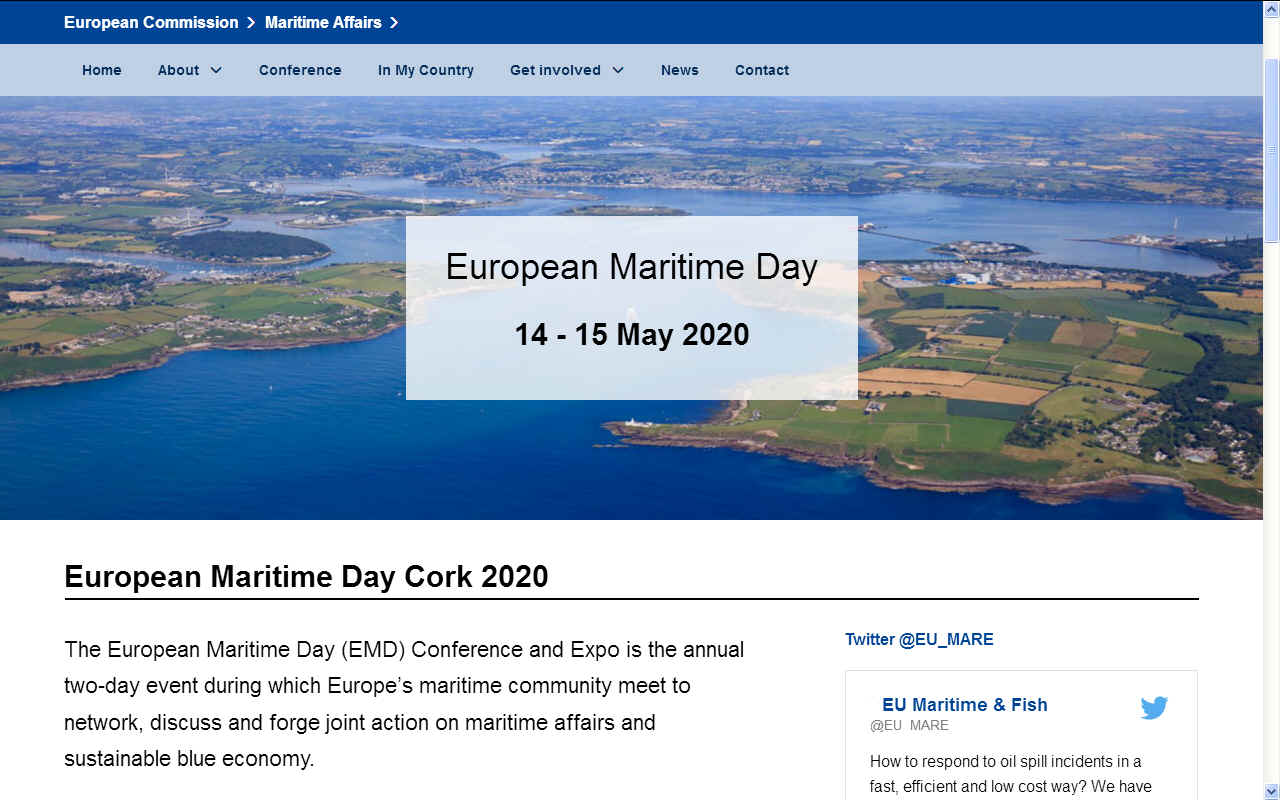
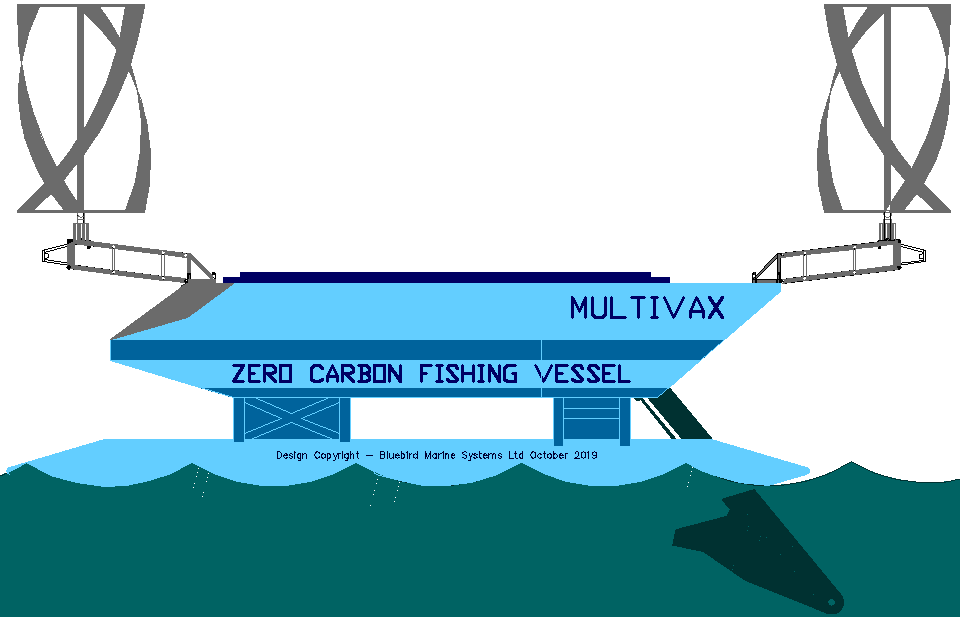
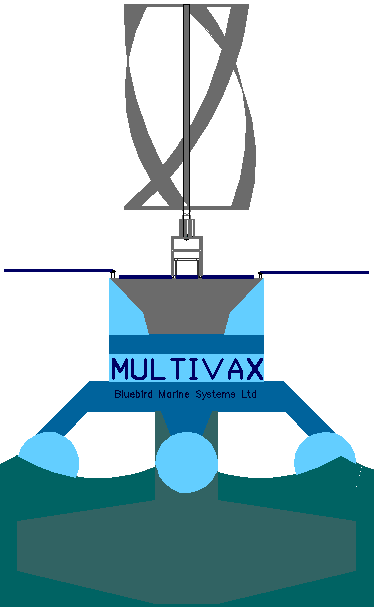
ZERO
CARBON FISHING & NO NETS - Traditional
fishing boats
do not lend themselves to solar or wind assisted conversions, hence may
not be zero carbon. Changing from diesel to clean energy requires a clean
sheet of paper approach and a re-think of how to solve the problem. The
SeaVax concept has long been seen as capable of being modified for oil
recovery and fishing
for food,
rather than recycling marine plastic. If marine transport is to comply
with the IMO
directives for 2030, 2040, 2050 and 2100, we must start looking at other
ways of harvesting fish
to prevent global
warming getting any worse.
SeaVax
uses solar and wind energy collectors that track the wind and sun in
combination such as to manage potential incoming energy for maximum
harvest and storage. The turbine generators used could be horizontal (HAWT)
or vertical axis (VAWT), where horizontal axis were thought to offer
higher power to weight ratios, but that this may now be the subject of
research, where a new type of VAWT potentially offers similar outputs with
perhaps other advantages.
Another
advantage of modifying the SeaVax concept to fishing is that there are no
plastic fishing nets to pollute the oceans. Operating
a zero carbon fishing boat that uses no nets in the catching process,
opens up a whole new era of sustainable opportunities in terms of the United
Nations development goal: SDG14.
Nets are costly items that choke the ocean when discarded irresponsibly.
The possibility of modifying a SeaVax
head to allow for variable depth trawl of selected fish species holds the
potential to alleviate ghost nets to some extent, though fishing with
regular nets would also be a feature of the design.

ZERO
CARBON SOLUTION
- Although a potential solution to the problem, we suspect that this is
not what the European Commission are looking to tease out of the woodwork.
They are probably hoping for a miracle cure that might be applied to
conventional hulls, such as a new fuel or process that renders existing
shipping zero
carbon - and bully for that. Nevertheless, this is a possible way of
reaching targets, or at least easing the pressure - and for that reason -
it is put forward as a funding contender. Vessels that are solar and wind
powered should (in our view) be developed alongside other incremental
emission reduction means.
An
alternative to constructing this vessel in aluminium alloy as a purpose
build, is to purchase an existing cargo vessel that is due for retirement,
and to retro-fit solar panels and wind generators, to be able to measure
the savings. Operators of fleets might want to consider partnering to this
project, maybe to provide a donor vessel. Please note that these drawings
are Design Copyright © October 2019, Bluebird Marine Systems Ltd and
Cleaner Ocean Foundation Ltd.
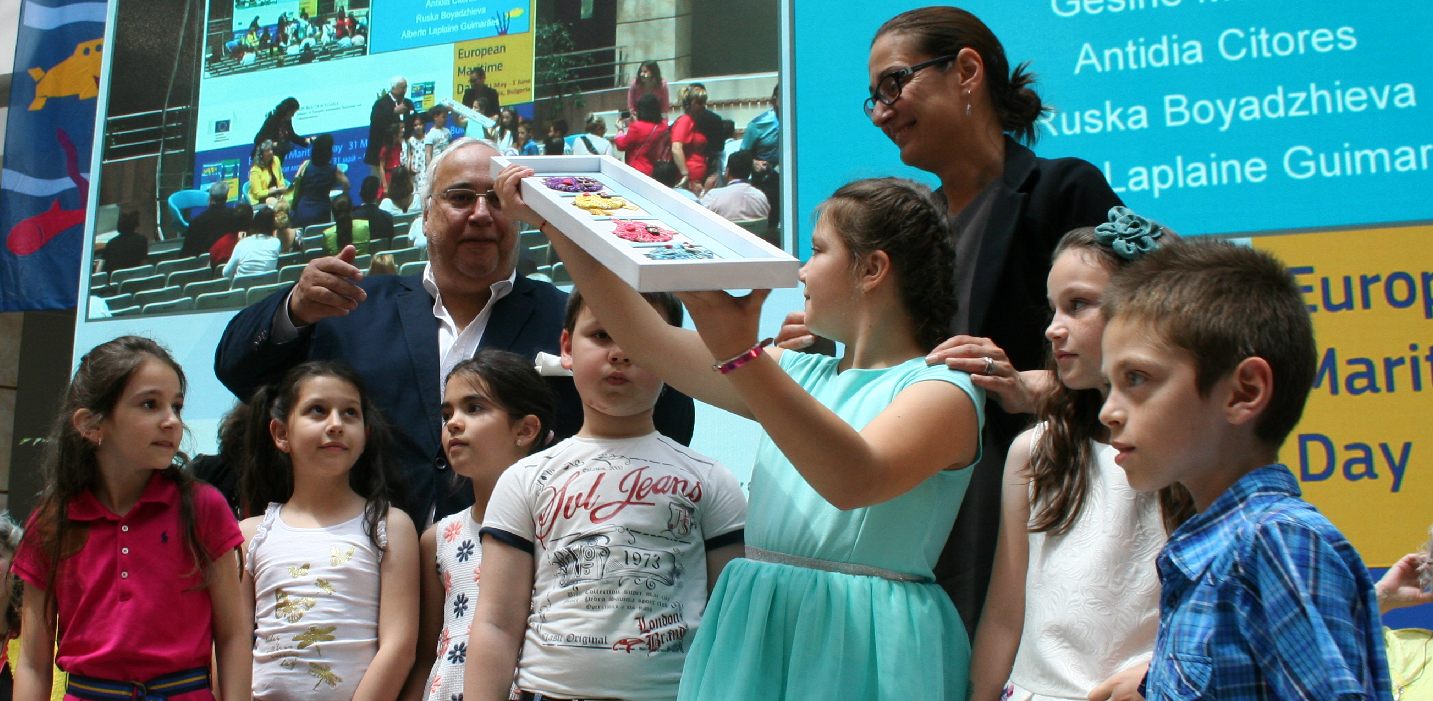
JUNE
2018 HANDOVER CEREMONY - Alberto Laplaine Guimarães accepts a
gift of maritime art from Ruska Boyadzhieva. Alberto is the Secretary
General of Lisbon City Council and Ruska the Deputy Mayor of Burgas,
Bulgaria. Copyright © photograph June 1 2018 Cleaner
Ocean Foundation.
European Maritime
Day, celebrated on 20 May each year, seeks to raise European citizens' awareness of the seas and their importance. Several events take place during that day, including an annual stakeholder conference co-organised by the European Commission.
The event has been run for a number of years since 2008, each time at a
different European venue.
EMD 2017 - Poole, UK
The
event for this year is at the Lighthouse, Poole in Dorset, UK. For more
information on the event, click
here.
EMD 2016
- Turku
The EMD 2016 conference attracted 1200 participants from the European maritime community. They focussed their discussions on "Investing in competitive blue growth - smart and sustainable solutions", identifying and highlighting the practical steps needed to drive blue growth investments, as well as innovation and change in the blue economy.
The event included 66 matchmaking meetings, a networking village with more than 30 exhibitors, a photo competition of more than 600 entries, site visits, a classical concert, an art project on marine litter and two days of public events around maritime themes in Turku (20-22 May).
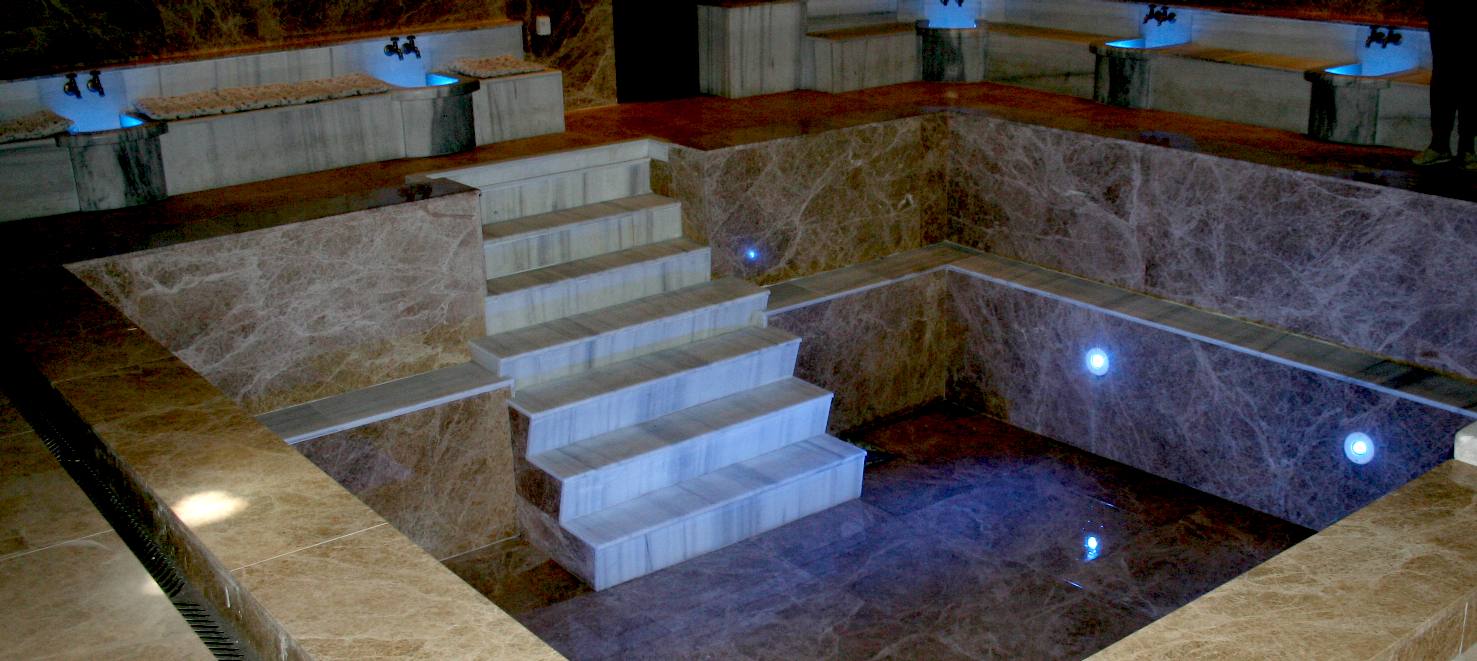
AQUAE
CALIDAE - As part of the European Maritime Day at Burgas, Bulgaria,
delegates visited several sites of local interest including these Roman
baths where hot mineral springs attracted a lot of great rulers like
Byzantine Emperors. In addition to protecting our future, protecting our
archaeological past is also a conservation issue. Copyright © photograph June
2 2018 Cleaner
Ocean Foundation.
European Maritime Day - taking Blue Growth to the next level 24/05/2016
Blue growth is here to stay, concluded the 1200 marine and maritime economy stakeholders who gathered in Turku, Finland, last week to celebrate the 9th edition of the European Maritime Days. “A sustainable marine economy is not a dream, it is a reality”, said Commissioner
Karmenu Vella in the Opening Session of the conference. “Across Europe – he went on - people are working hard on innovation and pushing boundaries”. European Commission Vice-President Katainen listed a number of blue economy projects already selected for EFSI support, stressing the importance of new investments for all maritime innovations.
Since the launch of the Blue Growth Strategy by the European Commission in 2012, the maritime economy has been moving steadily forward, with various sectors striding decisively towards creating jobs and sustainable growth while safeguarding seas and oceans. The current 75,000 jobs in offshore wind energy are a case in point.
Investing in the Blue Economy was precisely the focus of the first 'Leadership Exchange' panel, and the best way to make investment happen is by working on the ground and mobilising bottom-up initiatives. "Jobs – said Committee of the Regions president Markku Markkula - will come from local activities”. The environmental dimension was central to many of the leaders’ interventions: “Healthy marine eco systems are the foundation of all we do” stated Lasse Gustavson, Oceana’s director for Europe. Moreover, being at the cutting edge of sustainability gives Europe the competitive edge for export. As Bernard Meyer, CEO of Meyer
Shipyards, put it: “The ocean is our market.”
But there is a crucial prerequisite, and that is good ocean governance. Not just the Law of the Sea, which has been in place for 4 centuries, but something more: an interplay, in the words of Irish vice-admiral Mark Mellet, between governments, law, institutions, civil society and industry. EU policies and strategies contribute to streamlining that interplay: for example to MEP Gesine Meissner “Maritime Spatial Planning is an important tool”.
“Now we need to move to the next level, and encourage blue growth more systematically”, said Commissioner Vella.
Within the conference some twenty workshops and five thematic sessions discussed a wide range of topics: innovation, smart specialisation and sustainable solutions for blue growth, potential and challenges of sectors like cruise tourism and ocean energy, clean shipping and environmental technologies, the role of ocean governance, Maritime Spatial Planning and multiple uses of space, the importance of data and knowledge, marine litter, the importance of digitalization and connectivity, and the role of business actors including SMEs and clusters.
On the second day findings were discussed and reported back to a second 'Leadership Exchange' panel which comprised, besides the European Commission, representatives from Member States and regional governments, industry, civil society and the European Parliament.
The key messages emerging from the two intense days of debate included:
* Clusters are enablers that can connect good ideas – of SMEs and others – to industry partners and finance providers and help drive transitions to new blue growth activities.
* Sectors such as ocean energy provide massive opportunities for growth, jobs and global environmental gains; we should not be discouraged by the challenges that are still outstanding, but should tackle them gradually and keep a long term focus.
* Ocean Energy also shows how important it is to prioritise strategic investments that provide returns not only in economic terms but also in terms of climate and environmental benefits.
* Access to finance continues to be a challenge. Policy makers have a huge responsibility to strengthen risk guarantees, cut red tape and ensure stable regulatory environments.
Action at regional level has a huge role to play in boosting blue growth. The most advanced regions are systematically developing their transnational partnerships to maximise their potential and bundle strengths. This could be further facilitated through wider blue growth platforms that could turn the ambitions of these actors into concrete and joint investments.
If we are to get a return from all the investments in innovation and infrastructure, developing skills is critical. It is hard to predict what future jobs will entail, so it is important to educate also for the 'unknown'.
The element to emphasise when attracting capable and motivated young people to maritime careers is not just the purely technical interest of the profession but also the role of 'steward of the oceans'.
Blue Growth can only thrive within a strong and reliable international ocean governance system, for which intense cooperation and stricter implementation and enforcement globally are needed.
In a parallel action, the European Maritime Day this year has hosted the photo competition #MyPortofTurku, organised by DG MARE. The wide participation (almost 600 entries) and the exhibition of the 50 best photos generated a lot of interest for the participants and the stakeholders.
The Commission thanks participants for their insights and will follow up on these conclusions. The conference's leitmotif was that economic growth and sustainability are not in opposition, but go hand in hand. The integration of the two, through innovation and good ocean governance, will be the key to achieving healthy and prosperous oceans.
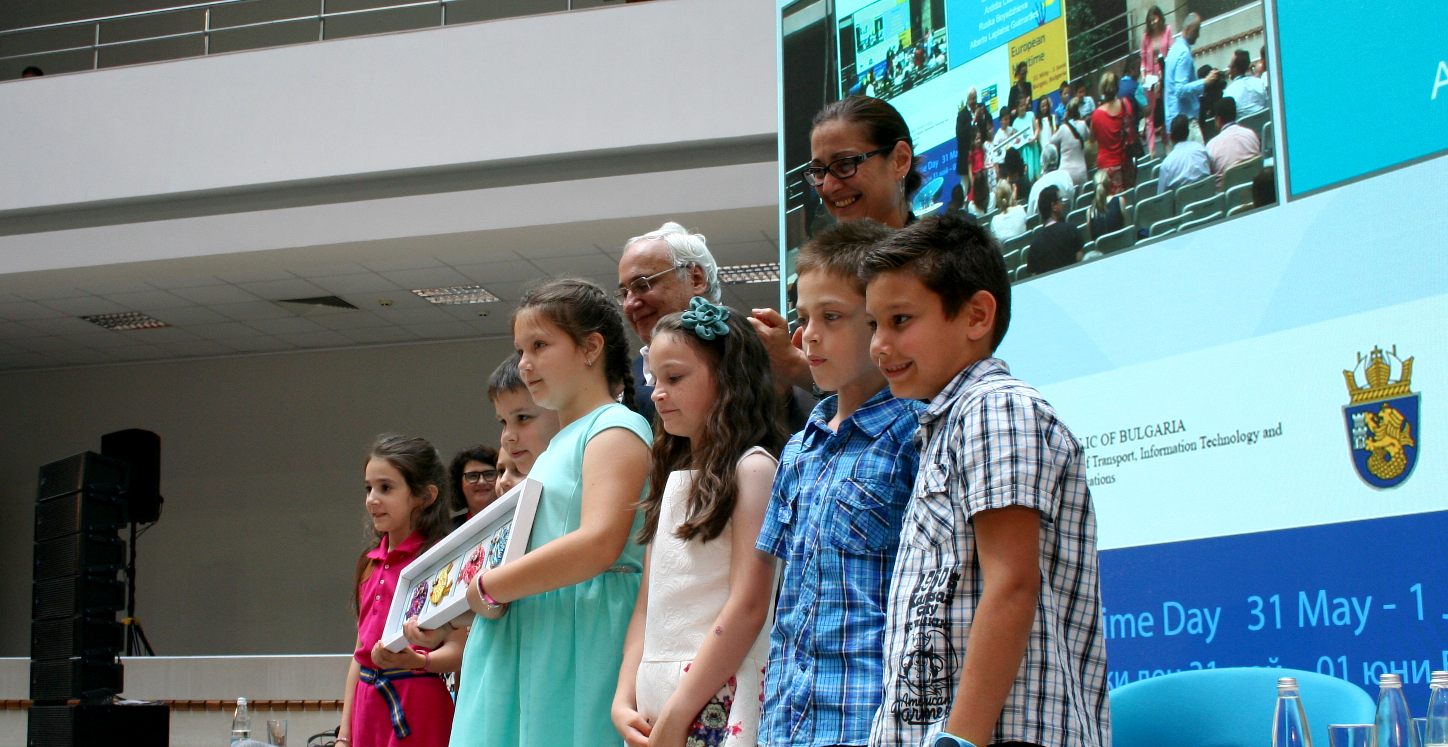
FUTURE
OCEAN AMBASSADORS - The children of Burgas present a hand made
souvenir of the city to the city of Lisbon. Copyright © photograph June 1 2018 Cleaner
Ocean Foundation.
EMD
HEADLINE THEMES
*
Brussels
2008: "A regional approach to the implementation of Maritime
Policy"
*
Rome
2009: "Integrated Maritime Policy and the contribution of
maritime clusters"
*
Gijón
2010: "How to foster innovation?"
*
Gdansk
2011: "Maritime Policy: Putting People First"
*
Gothenburg
2012: "Sustainable Growth from the Oceans, Seas and Coasts"
*
Valletta
2013: "Coastal Development and Sustainable Maritime Tourism"
*
Bremen
2014: "Innovation driving Blue Growth"
*
Piraeus
2015: "Ports and Coasts, Gateways to Maritime Growth"
*
Turku
2016: "Investing in blue growth – smart and sustainable
solutions"
*
Poole
2017: "The Future of our Seas"
*
Burgas
2018: Bulgaria "TBA"
*
Lisbon
2019: Portugal "TBA"
*
Cork
2020: Ireland "City"
*
Den
Helder 2021: The Netherlands "TBA"
*
Ravenna
2022: Italy "TBA"
*
Brest
2023: France "TBA"
*
Svendborg
2024: Denmark "TBA"
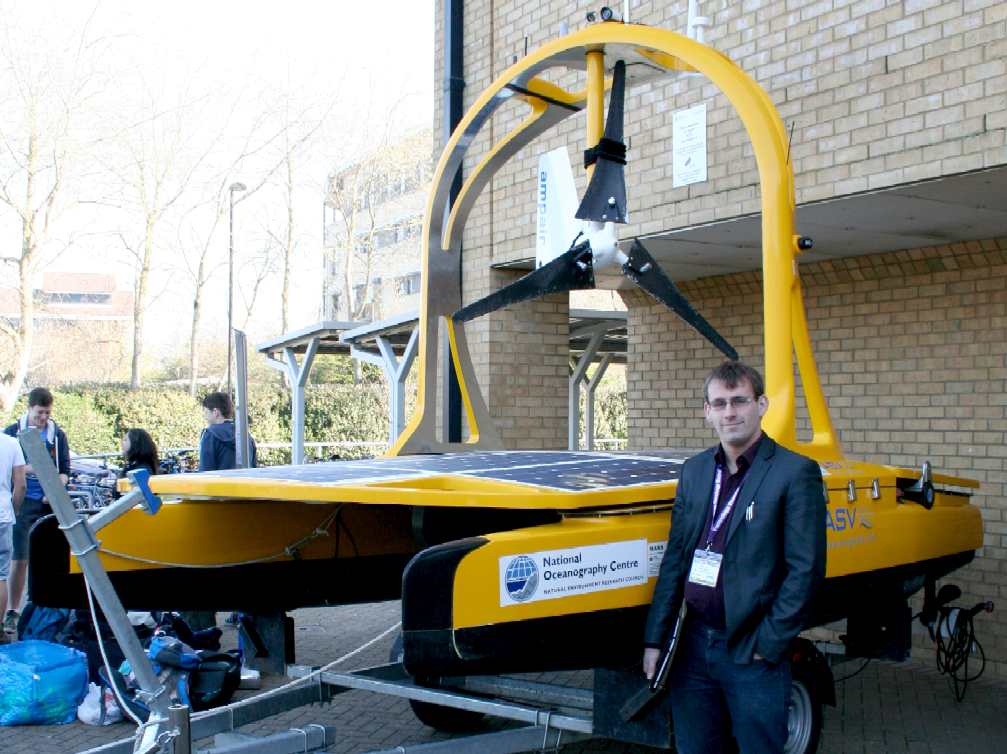
SURVEY - On display
outside the NOC, this solar and wind assisted catamaran was developed with
the help of NERC and DSTL funding, the result of a competition to find
long endurance vessel. There is an onboard diesel, but when the fuel runs
out the vessel is not energy autonomous - or at least that was how it was
when first launched.
European Maritime Day 2013 - Valleta, Malta
The European Maritime Day is celebrated each year on 20 May since 2008. This annual event was established jointly by the European Council, the European Parliament and European Commission as part of the EU's Integrated Maritime Policy launched in 2007. Its aim is to provide an occasion to highlight the crucial role that oceans and seas play in the everyday life not only of coastal communities, but of all EU citizens, and for Europe's sustainable growth and jobs at large, and to encourage better stewardship of coastal zones, seas and oceans by all citizens and actors concerned. During European Maritime Day, tribute is paid to "Maritime Europe" and all maritime sectors and activities are put in the spotlight to help European citizens realise the real outreach and variety of sea-related activities going on in Europe.
After Brussels 2008, Rome 2009, Gijon 2010, Gdansk 2011, and Gothenburg 2012, the 2013 European Maritime Day will be held on the 20 and 21 May in Valletta, Malta.
Malta is the most southern point of the EU. It has been called the gateway to the Mediterranean, and throughout modern and ancient history, its location has given it great strategic maritime importance. For thousands of years, Malta has been the outpost between the East,
Africa and Europe.
Malta has a long maritime tradition goes back thousands of years and currently has the largest shipping register in Europe. As a maritime nation Malta is proud to be hosting the 2013 European Maritime Day.
European Maritime Day 2012 - Gothenburg
The city of Gothenburg will host the 2012 European Maritime Day Conference. The event will be held from 21 to 22 May in Eriksbergshallen at Eriksberg, Gothenburg, in the former shipyard area of central Gothenburg. The conference is co-organised by the Directorate-General for Maritime Affairs and Fisheries, the Region Västra Götaland, the City of Gothenburg and the Swedish Ministry of Enterprise. The theme of this year's conference is "Sustainable growth from the oceans, seas and the coasts". Among the speakers are Commissioner Ms. Maria Damanaki, the Secretary General of the International Maritime Organisation, Mr. Koji Sekimizu, the Swedish Minister of Infrastructure, Ms. Catharina Elmsäter-Svärd, the Swedish Minister of Environment Lena Ek and the CEO of Shipping, Drilling and Ferries for Stena AB, Mr. Carl-Johan Hagman.
European Maritime Day 2011 - Gdansk
The city of Gdańsk in the Pomerania region of Poland has been chosen as a location for the 2011 European Maritime Day Conference. The event will be held from 19 to 20 May at the premises of the Baltic Philharmonic Orchestra. The conference is being co-organised by the Directorate-General for Maritime Affairs and Fisheries, Ministry of Infrastructure of Poland, authorities of the Pomerania Region, and the city of Gdańsk. Its programme will focus on jobs and training in the maritime sectors and on the maritime sectors' potential to trigger the economic growth in the coastal regions.
European Maritime Day 2010 - Gijon
The city of Gijón Asturias was chosen by the European Commission to organise the 2010 European Maritime Day Conference that was held between 18 and 21 May 2010. This event was part of the events within the Spanish presidency of the EU. The Commissioner Joe Borg, the State Secretary of the Spanish Government, Diego López Garrido, and the President of Asturias Vicente Álvarez Areces were in charge of formalising the agreement.
Almost 2000 European Maritime Policy stakeholders attended the conference. The main theme was innovation, in particular its role in the design of competition policy, environmental protection, improvement of working conditions and
employment On 20 May Felipe, Prince of Asturias, EU Commissioner Maria Damanaki, Diego López Garrido, Vicente Álvarez Areces, and the Mayor of Gijón Paz Fernández Felgueroso spoke.
European Maritime Day 2009 - Rome
It was held in Rome and focused public attention both on Europe's rich maritime heritage and on the crucial role the maritime sector plays in the development of a sustainable future for the EU. The three-day conference was hosted by the Italian Government. High level speakers included Commission President José Manuel Barroso, Rodi Kratsa-Tsagaropoulou, Vice-President of the European Parliament and Stefan Füle, Minister for European Affairs of the Czech Republic representing of the Presidency of the Council of the EU; as well as around 30 ministers from EU Member States and MED countries The Commission was also represented with Vice-Presidents Antonio Tajani and Verheugen, and Commissioner Joe Borg. More than 1200 people attended the Conference which had 125 speakers.
European
Maritime Day 2008 - Brussels
In 2008, the European Maritime Day was celebrated for the first time. The event included a stakeholder conference in Brussels 19-20 May, which focused on the regional approach to the implementation of Maritime Policy, and dialogue with stakeholders. The European Maritime Day was officially launched on 20 May 2008 in Strasbourg where the President of the European Parliament Hans-Gert Pöttering, Council President Janez Janša, and Commission President José Manuel Barroso signed a Joint Tripartite Declaration establishing a ‘European Maritime Day’.
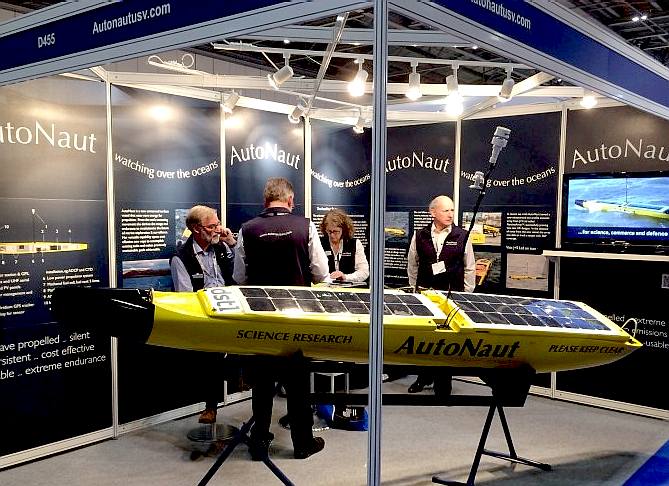
The AutoNaut from MOST
is a solar and wave powered boat that is ideal for long endurance ocean
monitoring, data collection and transmission, but cannot do anything that
requires a significant amount of energy. It is rather beautifully made
with great attention to detail.
MATCHMAKING
EVENT - EUROPEAN MARITIME DAY Expand your international network, explore new ideas and develop cooperation possibilities.
The event is organised in the framework of European Maritime Day Conference
2017, which will take place on the 19th of May 2017 in Poole (UK). The European Maritime Day (EMD) is an annual event which welcomes Europe's growing maritime community gathering EU maritime stakeholders and EU policymakers to discuss, debate and exchange best practices. Participants come from ports, shipping industries, clusters, environmental associations, NGOs, trade unions, scientific and research institutions, and local, regional, national and European authorities, amongst others.
Focus
This networking event targets innovative companies, universities, researchers, public authorities and other organisations interested in sharing new project ideas and finding collaboration partners
in relation to:
* Safety and security,
* People and skills,
* Innovation and growth,
* Sustainability and governance
Reasons to participate
It is an ideal way to find technology and business partners through pre-arranged meetings during an event which attracts delegates and experts from across
Europe and beyond. You simply need to register, present yourself, your company/organisation and a cooperation idea and select partners of interest to you in advance of the event.
The earlier you submit your collaboration profile, the more it will be recognized.
MAIN
TOPICS
Maritime Industries
Maritime Policy
Coastal Areas and Ports
Maritime Environment and Protected Areas
Maritime and Shipyard Technologies and Equipment
Maritime Services, Transport and Shipping
Maritime and Port Security
Skills and Training
Blue Growth
Aquaculture
Coastal Tourism
Marine Biotechnology
Ocean Energy
Seabed Mining
Marine Research, Development and Innovation
CONTACTS Lighthouse Centre for the Arts 21 Kingland Rd, Poole, Dorset, UK
Alistair Cox Enterprise Europe Network South West +44 (0)7717 416023 alistair.cox@businesswest.co.uk
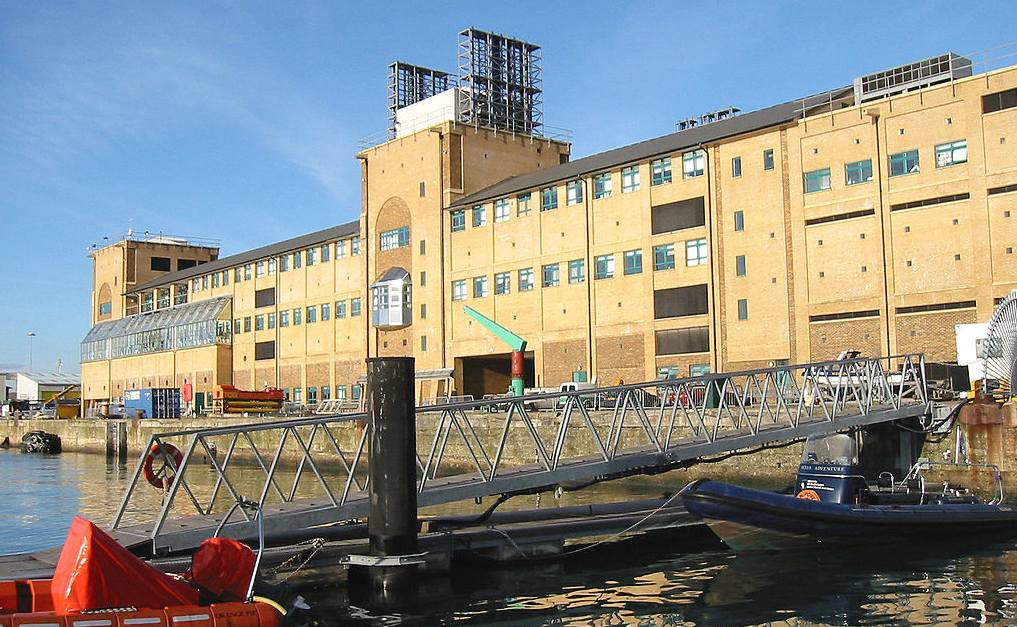
The
NOC building at Southampton is conveniently located to launch and provision
ocean voyages.
LINKS
& REFERENCE
http://www.emodnet.eu/european-maritime-day-%E2%80%9C-future-our-seas%E2%80%9D https://cpmr-northsea.org/event/european-maritime-day-2017/ https://southbaltic.eu/-/european-maritime-day-poole https://www.b2match.eu/emd2017 http://www.enterprise-europe.co.uk/content/events/2017/05/european_maritime_day_2017_2603/# http://ec.europa.eu/maritimeaffairs/maritimeday/en/poole-2017 http://www.vasab.org/index.php/events/item/342-european-maritime-day-2017-poole http://www.poole.gov.uk/newsroom/2013-news-archive/july-2013/poole-to-host-european-maritime-day-2017/ https://ec.europa.eu/maritimeaffairs/content/european-maritime-day-taking-blue-growth-next-level_en https://en.wikipedia.org/wiki/European_Maritime_Day http://ec.europa.eu/maritimeaffairs/maritimeday/en/2008 https://www.youtube.com/watch?v=wNZ90rUkog0 http://www.emodnet.eu/european-maritime-day-%E2%80%9C-future-our-seas%E2%80%9D https://cpmr-northsea.org/event/european-maritime-day-2017/ https://southbaltic.eu/-/european-maritime-day-poole https://www.b2match.eu/emd2017 http://www.enterprise-europe.co.uk/content/events/2017/05/european_maritime_day_2017_2603/# http://ec.europa.eu/maritimeaffairs/maritimeday/en/poole-2017 http://www.vasab.org/index.php/events/item/342-european-maritime-day-2017-poole http://www.poole.gov.uk/newsroom/2013-news-archive/july-2013/poole-to-host-european-maritime-day-2017/ https://ec.europa.eu/maritimeaffairs/content/european-maritime-day-taking-blue-growth-next-level_en https://en.wikipedia.org/wiki/European_Maritime_Day http://www.oceanbusiness.com
ACIDIFICATION
- ADRIATIC
- ARCTIC
- ATLANTIC - BALTIC
- BERING
- CARIBBEAN - CORAL - EAST
CHINA
ENGLISH CH
-
GOC - GULF
MEXICO
- INDIAN
- MEDITERRANEAN -
NORTH SEA - PACIFIC
- PERSIAN GULF - SEA
JAPAN
STH
CHINA
- PLASTIC
- PLANKTON - PLASTIC
OCEANS - SEA
LEVEL RISE
- UNEP
MARINE
ACADEMIC INSTITUTIONS A-Z
Australian
Maritime - Geneve
- Hawaii
Renewable - NERC
- Newcastle
Naval
NOC
Oceanographic - Plymouth - Portsmouth
- Seoul
Naval - SOTON
Strathclyde
Marine - Sussex
- TU
Delft - USP South
Pacific - Webb
Institute
|
















